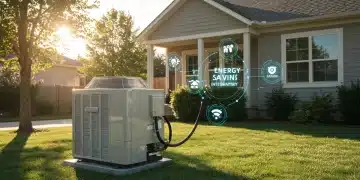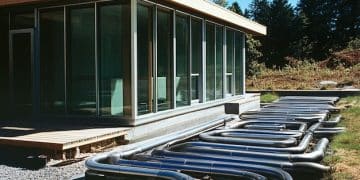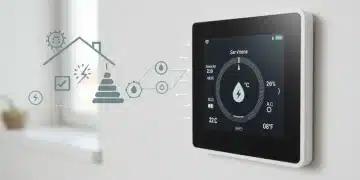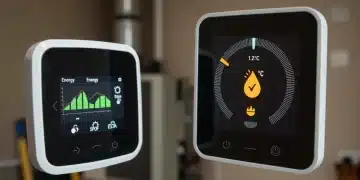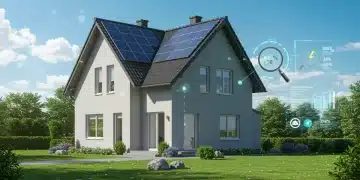Heat Pump Technology: The Future of Home Energy Efficiency
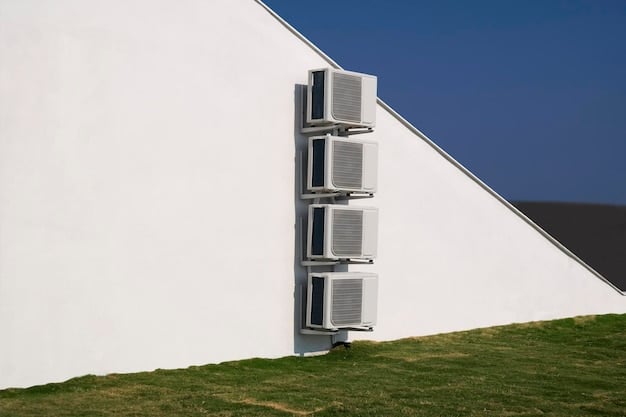
Heat pump technology represents a significant advancement in energy-efficient home heating and cooling, offering a sustainable alternative to traditional HVAC systems by transferring heat rather than generating it.
Are you searching for a more efficient and eco-friendly way to heat and cool your home? Heat pump technology: the future of energy-efficient home heating and cooling, offers a promising solution.
Understanding Heat Pump Technology
Heat pumps are gaining popularity as an energy-efficient alternative to traditional heating and cooling systems. Instead of generating heat, they transfer it from one place to another, making them incredibly efficient.
This technology has the potential to revolutionize how we heat and cool our homes, leading to significant energy savings and reduced carbon emissions.
How Heat Pumps Work
Heat pumps operate on the principles of thermodynamics, using a refrigerant to absorb and release heat. During the winter, they extract heat from the outside air (even in cold temperatures) and transfer it inside. In the summer, the process is reversed, removing heat from the inside and releasing it outdoors.
- Refrigerant Cycle: The refrigerant circulates through the system, changing between liquid and gas to absorb and release heat.
- Compressor: The compressor pressurizes the refrigerant, increasing its temperature.
- Reversing Valve: This valve allows the heat pump to switch between heating and cooling modes.
Compared to traditional heating systems that burn fossil fuels, heat pumps use electricity to power the heat transfer process, making them a cleaner and more sustainable option.
In essence, heat pumps provide both heating and cooling from a single unit, offering a versatile and energy-efficient solution for year-round comfort.
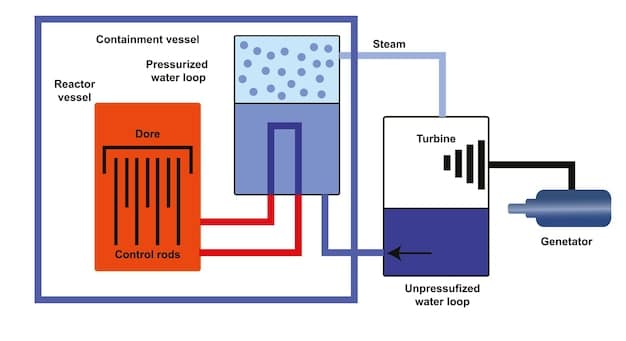
In conclusion, understanding the basic principles of heat pump technology is crucial to appreciating its energy-saving potential and environmental benefits.
Types of Heat Pumps
Different types of heat pumps cater to various climates and building designs. Each type has its own set of advantages and considerations.
Choosing the right type of heat pump is essential for maximizing energy efficiency and ensuring optimal performance.
Air-Source Heat Pumps
Air-source heat pumps (ASHPs) are the most common type, transferring heat between the indoor and outdoor air. They are relatively easy to install and cost-effective.
ASHPs are a great choice for moderate climates, but their efficiency may decrease in extremely cold temperatures.
Geothermal Heat Pumps
Geothermal heat pumps, also known as ground-source heat pumps, utilize the constant temperature of the earth to provide heating and cooling. They are more energy-efficient than ASHPs, especially in extreme climates.
- Higher Efficiency: Geothermal systems offer consistent performance regardless of outdoor temperature fluctuations.
- Higher Upfront Cost: Installation involves digging trenches or boreholes, increasing initial expenses.
- Long Lifespan: These systems can last for decades with proper maintenance.
While the initial investment is higher, geothermal heat pumps can result in significant long-term energy savings and reduced environmental impact.
Ultimately, selecting the appropriate heat pump depends on factors like climate, budget, and property characteristics. Consulting with a professional installer can help you make the best decision.
Benefits of Heat Pump Technology
Heat pumps offer a wide array of benefits, ranging from energy savings to environmental protection. These advantages make them a compelling choice for homeowners and businesses.
By adopting heat pump technology, users can enjoy increased comfort while contributing to a more sustainable future.
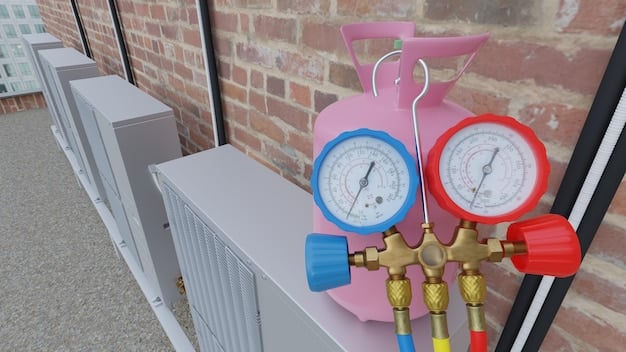
Energy Efficiency and Cost Savings
Heat pumps are significantly more energy-efficient than traditional heating and cooling systems, leading to lower utility bills. They can provide up to four times more heating energy than the electricity they consume.
This high efficiency translates to considerable cost savings over the lifespan of the system.
Environmental Impact
By using electricity instead of fossil fuels, heat pumps reduce greenhouse gas emissions and minimize your carbon footprint. They also eliminate the risk of carbon monoxide leaks associated with combustion-based heating systems.
- Reduced Emissions: Heat pumps contribute to cleaner air and a healthier environment.
- Sustainable Heating and Cooling: They support the transition to renewable energy sources like solar and wind power.
- Lower Carbon Footprint: Heat pumps help combat climate change by decreasing overall energy consumption.
Beyond the direct environmental benefits, heat pumps also promote energy independence and lessen our reliance on finite resources.
In summary, the adoption of heat pump technology not only benefits individual users but also contributes to broader environmental conservation efforts.
Installation and Maintenance
Proper installation and regular maintenance are crucial for ensuring the optimal performance and longevity of heat pump systems. A well-maintained system operates efficiently and reliably.
Investing in professional installation and maintenance services can prevent costly repairs and extend the lifespan of your heat pump.
Professional Installation
Installing a heat pump requires specialized knowledge and tools. A qualified technician will assess your home’s heating and cooling needs, recommend the appropriate system size, and ensure proper installation.
Professional installation guarantees that your heat pump operates at its peak efficiency.
Regular Maintenance
Routine maintenance tasks include cleaning or replacing air filters, inspecting coils, and checking refrigerant levels. These simple steps can significantly improve the system’s performance and prevent breakdowns.
- Air Filter Replacement: Replace filters every one to three months to maintain airflow and efficiency.
- Coil Cleaning: Clean coils regularly to remove dirt and debris that can reduce heat transfer.
- Professional Inspection: Schedule annual maintenance appointments with a qualified technician.
Additionally, keep the area around the outdoor unit clear of obstructions like leaves and snow to ensure proper airflow.
Ultimately, diligent maintenance practices not only increase the lifespan of your heat pump but also ensure that it continues to deliver energy-efficient heating and cooling.
Factors to Consider Before Switching to a Heat Pump
Switching to a heat pump is a significant decision that requires careful consideration of various factors. Evaluating these aspects will help you determine if a heat pump is the right choice for your home.
A thorough assessment of your individual needs and circumstances is essential before making the transition to heat pump technology.
Climate and Insulation
Heat pumps perform best in moderate climates with well-insulated homes. While advancements have improved their performance in colder regions, insulation remains a critical factor.
Poor insulation can lead to increased energy consumption and reduced efficiency.
Home Size and Layout
The size and layout of your home can influence the type and size of heat pump needed. Multi-zone systems may be necessary for larger homes to ensure consistent heating and cooling throughout the house.
- Load Calculation: Determine the appropriate heating and cooling capacity based on your home’s square footage.
- Ductwork: Ensure that your ductwork is properly sized and sealed to maximize efficiency (for ducted systems).
- Zoning: Consider zoning options to control temperatures in different areas of your home.
Moreover, the positioning of the outdoor unit should be carefully considered to minimize noise and ensure adequate airflow.
In conclusion, evaluating these factors will enable you to make an informed decision about whether a heat pump is a suitable investment for your home.
Government Incentives and Rebates
Many governments and utility companies offer incentives and rebates to encourage the adoption of energy-efficient technologies like heat pumps. These financial incentives can significantly reduce the upfront cost of installation.
Exploring available rebates and incentives can make heat pump technology more accessible and affordable.
Federal Tax Credits
The federal government provides tax credits for the purchase and installation of qualified heat pump systems. These credits can help offset a portion of the initial investment.
Consult the IRS guidelines or a tax professional for the latest information on eligible tax credits.
State and Local Rebates
In addition to federal incentives, many state and local governments offer rebates for energy-efficient upgrades. These rebates vary depending on the location and the specific heat pump model.
- Utility Company Programs: Check with your local utility company for available rebates and financing options.
- State Energy Offices: Visit your state’s energy office website for information on state-sponsored programs.
- Local Government Initiatives: Explore local government initiatives promoting energy efficiency and sustainability.
By taking advantage of these incentives, homeowners can significantly reduce the financial burden of switching to heat pump technology.
To summarize, government incentives and rebates play a crucial role in promoting the widespread adoption of heat pumps and advancing energy efficiency.
| Key Point | Brief Description |
|---|---|
| ⚡ Energy Efficiency | Heat pumps transfer heat instead of generating it, saving energy. |
| 🌍 Environmental Impact | Reduces greenhouse gas emissions by using electricity, not fossil fuels. |
| 💰 Cost Savings | Lower utility bills due to high energy efficiency. |
| 🛠️ Maintenance | Regular filter replacement and professional inspections ensure optimal performance. |
Frequently Asked Questions
▼
Heat pumps transfer heat rather than generate it. In winter, they extract heat from the outside air and transfer it inside. In summer, they reverse the process.
▼
Yes, modern heat pumps are designed to operate efficiently in cold climates. Geothermal heat pumps are especially effective in colder regions due to consistent ground temperatures.
▼
Heat pumps offer energy efficiency, reduced carbon emissions, and cost savings. They provide both heating and cooling from a single unit, making them a versatile choice.
▼
Regular maintenance includes replacing air filters every one to three months and scheduling annual professional inspections to ensure optimal performance and prevent breakdowns.
▼
Yes, federal, state, and local governments offer tax credits and rebates for installing energy-efficient heat pump systems. Check with your local utility company for more details.
Conclusion
In conclusion, heat pump technology represents a promising future for energy-efficient home heating and cooling. By understanding their operation, exploring different types, and considering the factors involved in installation and maintenance, homeowners can make informed decisions that lead to significant energy savings and environmental benefits. Government incentives further enhance the appeal of heat pumps, making them an increasingly attractive option for sustainable and cost-effective climate control.
